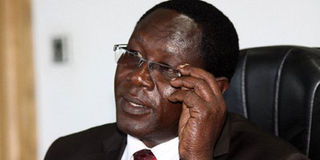New CCK boss takes office aware of the lurking Executive hand

Communications Commission of Kenya (CCK) director-general Francis Wangusi.
What you need to know:
- Although the authority is independent on paper, the offices of the President and Prime Minister have been issuing directives that mock its autonomy
- Just a week after Wangusi's appointment, it emerged that the commission was restrained from implementing the new mobile termination rates by a new directive from the government
- As he takes office, Mr Wangusi will have a hard task ensuring the industry is fairly regulated while at the same time appeasing powerful politicians
Tough times await the incoming Communications Commission of Kenya (CCK) director-general Francis Wangusi as he takes over regulation of an industry marred by political interference.
Despite CCK being touted as an independent regulatory authority, it has often had to give in to pressure from the government in making decisions on key issues in the communications sector.
And Mr Wangusi knows this pretty well as he told the Sunday Nation in an interview: “We are an independent government organisation and most of our decisions are autonomous. However, we don’t always escape without getting arm-twisted by powerful politicians with vested interests in the sector. This is one of the challenges I have to face as I take office as director-general.”
Just a week after his appointment, it emerged that the commission was restrained from implementing the new mobile termination rates by a new directive from the government, a move seen as protecting the interest of some operators.
Through a letter sent to the Information and Communications Permanent Secretary Bitange Ndemo, President Kibaki, through his private secretary Nick Wanjohi, directed that the status quo should remain until an all-inclusive study of costs and other relevant issues is undertaken and forwarded to his office for consideration.
The MTR debate has caused divisions in the telecoms sector with two operators, Safaricom and Telkom Kenya, pushing for a high rate while Airtel and yu maintained that the current rate should reduce to at least Sh1.44 as stipulated in the MTR policy adopted in 2010.
Safaricom, on January 30, wrote to the regulator requesting a fresh cost study on grounds that the current interconnection charges did not reflect the real cost of terminating a call across networks. However, CCK declined, saying it did not deem it necessary to conduct another cost study at the moment.
After months of debating, the four mobile operators met on May 29 and agreed on a compromised rate of Sh1.60 as what they would charge one another for terminating off-net calls on one’s network. The rate, which was to be effected in July in place of the earlier Sh1.44, has yet to be implemented.
Last week, Dr Ndemo said the matter is still in the hands of the Competition Authority of Kenya for analysis before implementation.
However, it has now emerged that the minister for Information and Communications had authorised CCK to implement the rate reduction on July 11, but the commission’s hands were tied by the President’s letter.
Safaricom Limited corporate affairs director Nzioka Waita said the company is not aware of the new developments shedding off suspicion that the President could be acting upon its request.
“We don’t know anything to do with the said letter, only the author would shed light on it,” Mr Waita said.
Telkom Kenya corporate communications manager Angela Mumo affirmed that the company has been demanding a fresh study but has not at any point requested indulgence from State House.
“We only sought its (State House) support in 2011 when we asked that the glide path be suspended until a fresh study is conducted to determine the economic and social impact of the resulting low tariffs. No study has been conducted so far and we need to have mechanisms in place to stop the destruction of the sector,” said Ms Mumo.
When the presidential suspension expired in June, it was expected that the CCK would resume the glide path but the operators instead agreed on the compromise Sh1.60 rate, which is yet to be implemented.
Dr Ndemo declined to comment on the new developments.
As he takes office, Mr Wangusi will have a hard task ensuring the industry is fairly regulated while at the same time appeasing powerful politicians.
“We will wait for the results of the study being conducted by the Kenya Institute for Public Policy Research and Analysis which is due in the next one month. We are still holding consultations to see if we can come up with an amicable solution,” Mr Wangusi said.
In a different tussle with the Executive, the office of the Prime Minister has warned CCK against revoking FM frequencies that the Royal Media Services is accused of acquiring illegally.
“This means you do not at all interfere with any frequencies and licences issued and being used by Royal Media Services Limited as contained in your notice,” said the letter sent by Permanent Secretary Mohamed Isakhakia.
Mr Wangusi told the Sunday Nation that his strategy at the helm of CCK will be adopting open consultations with all stakeholders.




